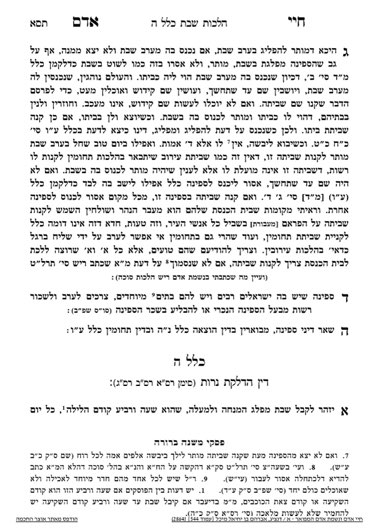We will be starting the Halachos of hadlakas neiros this week, and it will take approximately 35-40 shiurim. Sponsorship is available for the whole series or individual shiurim. All sponsorships benefit Kollel Zichron Amram.
We are continuing in siman 4, discussing sechiras reshus on a boat. We learned that when a sole owner of a building rents out his properties, he loses the ability to represent the tenants for sechiras reshus since the usage rights belong solely to the tenants. However, if the owner maintains the rights to use the dwellings, he can represent the tenants.
The poskim extend this concept to the idea that if the authorities (of a city, county, etc) have the ability to go into any property and use it as they need–i.e., the concept of eminent domain–that said authority can represent any non-Jews within their jurisdiction for a sechiras reshus. This includes the fact that emergency services can enter any property at any time.
Going back to the boat, many times the boat owners will store items in various cabinets throughout the cabins of the boat. Thus, they have maintained rights within the cabins, and can therefore represent everyone on board for sechiras reshus.
A hotel is more complicated. Hotels leave many items in the rooms they rent out (i.e.. the furnishings), but they all serve the tenant. If so, it would appear that the hotel owners have relinquished usage rights to the tenant for the duration of their hotel stay. Therefore, it would be necessary to perform sechiras reshus with each individual tenant.
Practically, in a contemporary city, the mayor’s office has the rights to perform sechiras reshus on behalf of the entire city, just as the management can do so on a boat. Hotels are more complicated due to the arrangement with the tenants.
The Chayei Adam writes that one will have to either perform a kinyan sechiras reshus, or make it a part of the payment that the Jew has usage rights in the boat on Shabbos. These options could be applied to a hotel as well.
Summary
There are three conditions necessary in order to carry on a boat:
- The first is that the boat has sides which can be considered an enclosure. This is assumed to be true for most boats automatically.
- The second is the need for an eruv chatzeiros. On a boat, this second condition can be fulfilled if there is a central kitchen and dining hall for all members of the boat. This applies to a hotel as well.
- The third is that they must, in some way, deal with non-Jews who are on the boat. This is done by performing a kinyan sechiras reshus kinyan with the non-Jewish parties.
- This kinyan can be performed with anyone who has usage rights over the properties in question. Thus, regarding a boat, since the owners often store items in the cabins, they can perform the kinyan.
- Alternatively, it can be stipulated in the payment agreement that the Jews have ownership of the boat over Shabbos.
- If they do not have usage rights, the kinyan must be performed with each individual owner.



